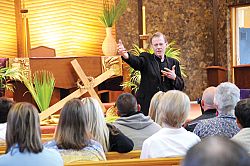RCIA retreat reflects on the Pascal mystery

SALT LAKE CITY — In keeping with tradition, the Most Rev. John C. Wester, Bishop of Salt Lake City, met April 12 with those in the Diocese of Salt Lake City who will be accepted into the Catholic Church at Easter.
"It’s a custom for the bishop to meet with them as the shepherd of the diocese, to reflect and pray with them," Bishop Wester said. "It’s an old, established tradition. In the very early Church the bishop would gather with the people and have a special retreat like this."
He added that he hoped the retreat would be a time for the elect to pause before the Easter vigil "so that they can reflect and pray about all that they have been doing through the whole RCIA process," he said. In particular, he wanted them to reflect on the passion, death and resurrection of Jesus Christ because "they’re being united to that Pascal mystery and, by that process, they’re becoming one with us."
As he opened the retreat, Bishop Wester told those who attended that taking time out for prayer and reflection is unusual in today’s society.
"We’re used to multi-tasking, being busy, running around," he said, "but by doing this we miss the way that God is revealing himself right here and now."
He encouraged them to take the reflection time between his talks to "just to be in God’s presence and to listen to what God is saying. Listening is the first step of prayer."
Bishop Wester focused his presentation on the Pascal mystery. In the first of the three sessions, he spoke of the Passion of Christ.
"The cross, the suffering, the Passion are all very important to our spiritual journey," he said. "The Pascal mystery is the central mystery of our faith."
The Virgin Mary suffered greatly as the Mother of God, the bishop pointed out, but stayed with Jesus even during his crucifixion. "In some ways Mary shows us how to accept our suffering in a way that is constructive; she shows us how to move through the suffering (Christ’s Passion) to the Resurrection," Bishop Wester said. "Mary is always telling us what suffering means in the context of the Church."
With suffering, people grow and become greater because of it, Bishop Wester said, but "this is all very antithetical to us in our society today. We’re constantly told that suffering is bad and that we should do something about it, to get away from it."
From a Christian perspective, however, "suffering is what God uses to widen the space for his entry into our lives," the bishop said. "As Christians, we want to be with Jesus. When we embrace Christ we embrace all of Christ, including the suffering on the cross. This is not the way of the world. This is the way of the disciple of Christ, the Christian, the Catholic – that my suffering be seen as an expression of God’s love for me."
Suffering, for a Christian, is always filled with hope as they look for Christ in their midst, revealing new life, he said.
During the second part of his presentation, Bishop Wester spoke of the death of Christ on the cross, pointing out that Jesus trusted the Father implicitly that his death would lead to something greater, which it did – the Resurrection.
Like Jesus, Mary trusted God, he said. "Mary’s fiat is the most beautiful expression of trust that there is. Trust leads to friendship, particularly with Christ."
Trusting is difficult, Bishop Wester acknowledged, but he challenged those at the retreat to reflect on how they give of themselves.
"How can Christ work in us?" he asked. "This is what it means to be a friend of Jesus – to abide in Christ. This is how we are transformed."
The Resurrection calls Christians to new life, Bishop Wester said during the third part of his presentation. "We’re now being called to relate in a deeper way. Discern how God is calling you to a new life; let your old life die. Good Friday is necessary if we are going to have Easter Sunday. Living a Pascal life implies a profound trust that everything ends not on Good Friday but on Easter Sunday."
© Copyright 2024 The Diocese of Salt Lake City. All rights reserved.

Stay Connected With Us